At Practical Action, we’re putting ingenious ideas to work. Such as empowering informal waste workers to lead the way transforming how different types of waste are managed in Faridpur, Bangladesh.
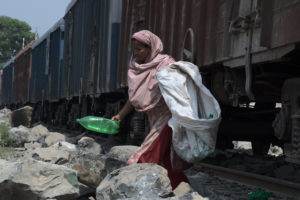
Taslima collects plastic waste from the area near the railway station and sells it to a recycling entrepreneur.
In our previous blog post, you learned how Faridpur’s citizens and authorities lack the funds to manage the city’s waste. Household waste, plastics and the contents of people’s toilets are dumped illegally, polluting the city, the rivers and the sea.
In this post, find out how we’ve joined with Faridpur Municipality, communities, other NGO’s and private businesses, to improve waste management in Faridpur. Our holistic approach employs bespoke solutions to manage each category of waste: household waste, plastics and the contents of people’s toilets.
Or work has already made a substantial difference, quadrupling the amount of toilet waste disposed of safely in the city and prompting the Government of Bangladesh to plan the roll out of our inclusive model across all 329 of the country’s municipalities.
Community-led solutions to the waste crisis
Our work, in collaboration with Faridpur Municipality, communities, other NGOs and private businesses, is improving waste management in Faridpur. People living in informal settlements can access affordable and reliable waste services, as well as being able to get their voices heard by authorities. Waste workers can do their jobs in safety and with dignity. Attitudes are changing and health is improving. And waste is being recycled into valuable materials, rather than being dumped illegally.
Giving communities a voice
By supporting informal waste workers and people living in low-income settlements to form co-operatives, they can talk directly to city authorities. They have a say in decision-making and a mechanism to communicate their needs and ideas in a way that wasn’t open to them before. They elect leaders and there is a clear structure for making things happen. Insurance policies and savings schemes give peace of mind and security and help people organise their finances.
“With the assistance of Practical Action, I’ve joined a co-operative. There are many benefits to my health and security. I’ve been able to save some money through the co-operative savings scheme. It makes it easier to pay for essentials like clothes and shoes for my children.”
Taslima Begum, plastic waste collector
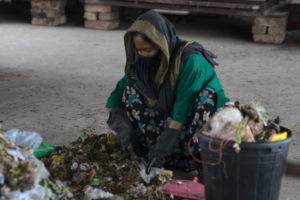
With our support, Aklima joined a co-operative of waste workers and now has protective clothing and is a member of a savings scheme.
Making waste work a healthy, safe and respected profession
We’ve developed innovative ‘gulper’ machines which mean pit emptiers can empty toilet pits from outside the pit. Before, they had to climb in and empty the pits with their bare hands and a bucket. With our help, waste workers have been able to get protective clothing, such as masks, boots and gloves. These mean they can do their job with less risk to their health.
“More recently, my neighbours have started to respect me more. They see that I’m supporting my family through this work. The attitudes towards waste workers in the city are changing. People are recognising the importance of the work we do and they are no longer thinking of us as low-grade workers.” Aklima Begum, waste sorter
Changing attitudes city-wide
We’re running an awareness campaign to encourage Faridpur’s residents to separate their recyclable plastics from their non-recyclable waste in their homes. This will make it quicker and easier for waste collectors, meaning that more waste can be collected and treated. A recent cycle rally event was part of this campaign. The target audience is young people who are more open to behaviour change.
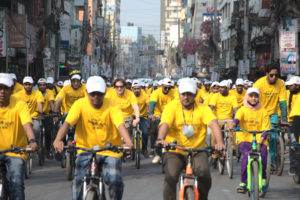
Community members, local influencers and Practical Action staff took part in the 4km cycle rally through Faridpur’s streets to raise awareness of plastic recycling.
Recycling waste into wealth
Collecting waste from Faridpur’s homes and streets safely and promptly is just the first step. If that waste is dumped outside the city, without being sorted and processed, the problem is just moved elsewhere. That’s why we’re working with waste pioneers and partners in Faridpur to convert waste into valuable commodities. This approach not only solves the issue of illegal waste dumping, it empowers waste pioneers to build successful businesses that are strengthening the local economy.
From poo and potato peelings to compost
We set up a treatment centre in Faridpur which produces an extremely rich compost made from a mixture of toilet and kitchen waste. This ‘co-compost’ adds nutrients to the soil and doesn’t result in soil degradation over time like chemical fertiliser does.
sorter
“I met with Practical Action staff and found out the best way to use their compost to improve my flower harvest. I have worked very hard to make my farm work and I’m proud of how well it’s doing. I make 10 to 15 million Taka profit each year.”
Liakat Hossain, flower farmer
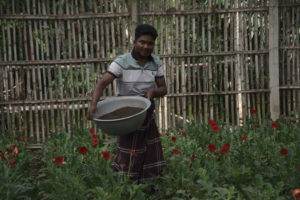
Liakat’s gerbera harvest is thriving thanks to Practical Action’s co-compost product.
For extra nutrients, just add worms!
We’re also producing an even richer vermiculture compost (the material is digested by worms) product using cow dung, kitchen waste and banana chips.
“The vermi-compost is popular among farmers because it’s very high in nutrients – higher than the co-compost. This means it fetches a higher price. It also takes less time to produce – 45 days. At the moment we’re only producing a small amount at a time. If we could expand this work, we could produce more, because there’s a big demand for it.”
Bulbul Hossain, Market Promotion Officer in the PA programme delivery team
New life from old PETs
We support informal plastic waste collectors to form co-operatives and receive training in business and marketing skills. These co-operative groups run successful businesses sorting and processing PET plastic to produce bags of recyclable plastic chips that are sold for a profit and are recycled into new products.
“Through working with Practical Action, we’ve been able to build a successful family business that doesn’t just collect the plastic but also sorts and processes it. Practical Action supported us to get the machine that cuts the plastic into smaller pieces that we sell to a company in Dhaka. Practical Action also supported us to have training in business skills and marketing.”
Rajon Mohammad Shakh, plastic waste recycling entrepreneur
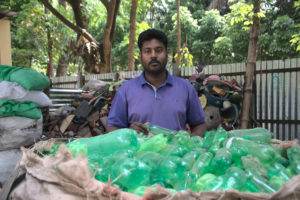
Rajon hopes to buy his own land in future so he can expand his plastic recycling business.
Turning thin plastics into power
A new project will use cutting-edge technology called pyrolysis to turn waste plastic into two valuable commodities – an oil that can be used as fuel and black carbon, which is used in print cartridges. The innovative process makes it possible to recycle thin polythene plastics, – a material that is not widely recycled and is therefore ignored by plastic collectors because it can’t currently be sold on for a profit.
“Pyrolysis is a type of chemical recycling that combines an absence of oxygen with high temperatures of between 500 and 600 degrees C. By using this process we convert the plastic waste into pyrolysis oil, which is similar to diesel but it’s more like a mix of diesel and gasoline. This can be used in engines.”
AHM Mojammal, Project Manager
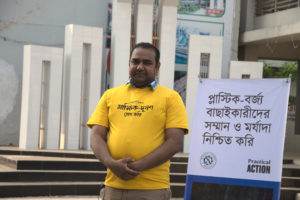
AHM Mojammal at the cycle rally awareness event. His t-shirt reads “we must stop plastic pollution to protect the environment”.
Our history of working at a grassroots level with informal waste and sanitation workers in Faridpur will be crucial to the project’s success. A private company, River Recycle, will provide technical expertise gained from a similar project in India. The work will be funded by the Lamor Foundation, who have experience cleaning up oceans and rivers through waste management, water treatment and by responding to oil spills.
Other partners will include local authorities in Faridpur, who will provide land for establishing the treatment plant plus other local and legal support, as well as the Bangladeshi Government ministries of Labour, the Environment, Energy, Mineral Resources and Local Government and Rural Development.
Achievements and next steps
We’ve already made a substantial difference on the ground in Faridpur. For example, 10% of the city’s toilet waste used to be disposed of safely. As a direct result of our work with waste pioneers and partners, coverage has quadrupled to 40%.
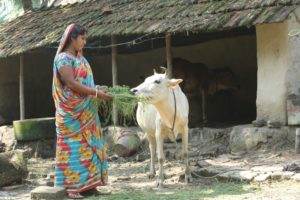
Alongside our work in cities, we’re working with farmers like Rupali in rural Bangladesh to combat the effects of climate change and improve their livelihoods. Our work is strengthening rural economies and helping mitigate urban migration.
The future looks even brighter. We’re working with the Government of Bangladesh to roll out our inclusive model across all 329 of the country’s municipalities through a new national action plan.
Explore Practical Action’s approach to waste management further through our Managing Our Waste 2021 report, which calls for a people-centred approach to the waste crisis. Find out how, rather than focusing on waste flows and particular types of waste, we must turn attention to the waste services people need, and to opportunities for the most marginalised to be a core part of the solution.
The situation in Bangladesh isn’t unique. These same difficulties are being faced globally by people living and working in cities. Climate change, urban migration and the waste crisis are worldwide trends that can only be tackled by people joining together to discover, implement and share solutions that work.
Join us in calling on city authorities and governments around the world to learn from Faridpur’s waste pioneers and work together to develop more ingenious solutions and scale them up to benefit more people. Together, we can clean up more cities in Bangladesh and around the world.